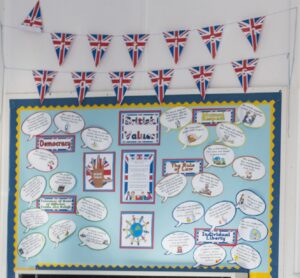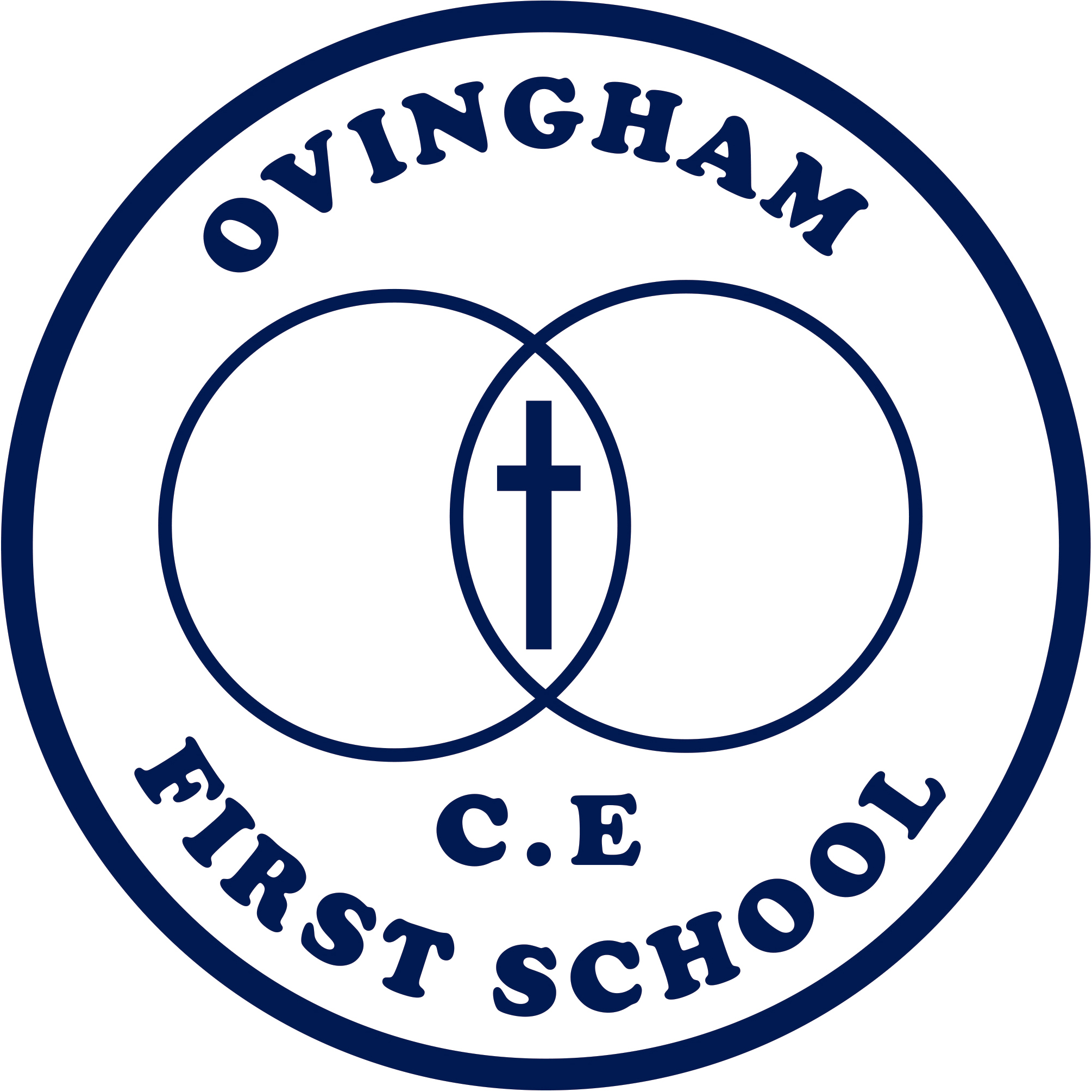 British Values statement for Ovingham CE First School
British Values statement for Ovingham CE First School
The DfE have reinforced the need ‘to create and enforce a clear and rigorous expectation on all schools to promote the fundamental British values of democracy, the rule of law, individual liberty and mutual respect and tolerance of those with different faiths and beliefs’.
The government set out its definition of British values in the 2011 Prevent Strategy, and these values have been reiterated in 2014.
Here at Ovingham CE First School, these values are regularly reinforced. They fit well within the ethos and aims of our Church of England school.
Ethos
Recognising its historic foundation, the school will preserve and develop its religious character in accordance with the principles of the Church of England and in partnership with the Church at parish and diocesan level.
The school aims to serve its community by providing an education of the highest quality within the context of Christian belief and practice. It encourages an understanding of the meaning and significance of faith, and promotes Christian values through the experience it offers to all its pupils.
Aims
- To promote the highest academic standards in every area of the curriculum so that all pupils achieve their full potential.
- To provide a welcoming, caring and supportive environment in which Christian values are central to the ethos of the school.
- To value all members of the school community. To provide equal opportunities for all and to show appreciation and respect for others regardless of sex, colour, culture, creed or ability.
- To nurture links with parents, parish and local community.
- To nurture and develop the skills and attitudes necessary for pupils to take responsibility for their own learning and behaviour.
- To use the financial resources available to the school to provide the highest possible levels of staffing and resources as well as good accommodation and environment.
Democracy
The Rights of the child are explained to our pupils annually when we support UNICEF’s ‘Day for Change’.
In school, pupils understand that they will be listened to by adults. Pupils are taught to respect one-another including the right to have their opinions heard, in line with our ethos as a Church of England school.
Pupils have some say in how the school is organised, how events are celebrated, through the workings of the School Council, with 2 elected representatives per class from Reception to Year 4 (with 2 extra representatives from Year 4).
The same democratic method of voting is used to populate the School Eco-Council, who work to reduce waste and reduce the school’s carbon footprint as well as educate the school in ways to be more eco-friendly.
The Headteacher regularly consults children in Worship sessions about issues and procedures in school and tries out suggestions from the children directly and through the School Council.
Annual pupil questionnaires give the pupils the opportunity to express their views about school.
Children are given leadership opportunities through becoming Playground Buddies, Reading Champions and House Captains.
The Rule of Law
The pupils understand that we need laws/rules in order for us all to be safe, both in our school and the world outside. Expectation of pupils’ behaviour is extremely high throughout school.
Whole School rules are simple and kept to a minimum. Classes develop their own age appropriate sets of classroom rules and sign Class Charters to signify that they will abide by the rules.
Children not conforming to school/class rules quickly understand that redress is necessary, that they are responsible for putting things right.
From an early age, children begin to understand that they are responsible for making choices about their own behaviour and that actions have consequences. Behaviour in our school is outstanding as pupils know what is acceptable behaviour for us all to get along well and what is not.
Year 4 Playground Buddies, who all apply for the position, are trained to assist at playtimes, to uphold order at doorways and be responsible for looking out for the welfare of younger pupils. They act as positive role models, adhering to the rules that ensure our school is safe and secure.
Visits from the fire service, police, NSPCC all reinforce the fact that there are rules in society, primarily set up to protect the interests of us all.
Individual Liberty
As part of our work on the Rights of Children, we talk about personal freedom. Some of our Worship stories are concerned with issues of freedom.
Children are encouraged to make choices in school within a safe and secure environment. For example they are able to exercise their choice about what lunch they would like by choosing from 3 options in the morning and wearing a coloured band. They can choose whether to join in with any lunchtime or after school clubs. Children are encouraged to be individuals, to express themselves and pursue interests that develop them as young people. Any personal successes gained outside school such as medals, certificates etc. are celebrated within school too.
We work hard to provide a school environment that is safe and secure. E-safety is taught throughout school. PSHE addresses issues such as friendship, conflict, making and sustaining relationships, preparing for change and recognising their self-worth, attributes and talents.
Year 4 pupils are given the opportunity to take on responsibilities and use their own initiative in their roles as Playground Buddies.
Mutual Respect
Our School Aims contain one that is all about respect and appreciation (see Aim 3).
Our Collective Worship programme regularly addresses the theme of respect for oneself and of other people, irrespective of their sex, colour, culture, creed or ability.
This core value is further reinforced within the whole school environment. Respect for one another is an essential ingredient of a happy secure learning environment where everyone is valued as an individual.
Pupils are regularly congratulated on the way they conduct themselves when out of school, particularly when taking part in events with other school groups. They consistently demonstrate respect for other people. This is also true when they visit other places of worship or when they are speaking about issues raised in the Newsround television programmes.
The adults within school are excellent role models in demonstrating respect for one another and the pupils in their care.
Tolerance of those with different faiths and belief
This value is also central to our School Aim number 3, which underpins how our school operates. Pupil here at Ovingham CE First school learn about the faiths and customs of others through our RE programme of study and within our Worship programme, visits to places of Worship and through exposure to issues from our multicultural and multi-faith society which are introduced into our classrooms for pupils to discuss, explore and understand.
In this way, pupils are prepared to take their place within this culturally diverse society in Britain.
We talk a lot about fairness and we discuss discrimination in language that they can understand, so that they can strive to create a society that is fair, both in school and beyond.
Our Collective Worship programme covers celebrations such as Chinese New Year, Diwali and Hanukah. We hold a Language and Culture week on an annual basis. We utilise world sporting opportunities such as the Olympics and the World Cup to learn about life and culture in other countries

